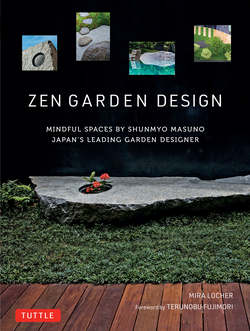Читать книгу Zen Garden Design - Shunmyo Masuno - Страница 8
На сайте Литреса книга снята с продажи.
ОглавлениеPART ONE
GARDENS IN PRIVATE RESIDENCES
“Just what kind of concepts are implied in the laying out of Zen gardens? In Zen, the working of the human mind is called ishiki or awareness. The word ishiki is made up of two characters, one meaning ‘mind’ and the other meaning to ‘know’ or to ‘discriminate.’ In the Zen sense of the word, the first character refers to action which adheres to something and the second refers to the judgement. For example, the statement ‘That person concerns and interests me’ would be the action, and ‘I therefore like him’ would be the judgement. However, when this awareness permeates every nook and cranny of the mind, it in turn becomes an unconscious act because the limits of consciousness enter the realms of the unconscious. Consequently, creating Zen gardens is not like a rich man’s hobby which attracts people’s attention. You have to go straight to the heart of the matter and create something which will have a lasting impression on people. Zen gardens should be at one with the people who view them, and an unforgettable garden is one that becomes an essential part of a person’s life. This is also true of the lives of those looking at the garden and its creator, for they are united by the garden, too.”1
When designing a garden for a private residence, whether in Japan or abroad, Shunmyo Masuno’s aim is to create a garden that has a “lasting impression” and “becomes an essential part” of the owner’s life. For a private residence, in particular, the owner lives with the garden every day and throughout the year, often working to maintain it as well as observe and enjoy it, so the garden must add to their life in positive ways and not become a burden. To accomplish this, not only does Masuno carefully consider the physical and programmatic elements of the garden—the client’s wishes, the layout and relationship of the various components, the views to and within the garden, the types of plantings, etc.—but he also focuses on designing the feeling or atmosphere of the garden. With this goal, he integrates the concept of omotenashi, or the spirit of hospitality or service without expectation of anything in return.
Considered to have been established by the tea master Sen no Rikyu, the founder of wabi-cha or the wabi-style of tea,2 as the mindset required to properly prepare and host a tea ceremony, omotenashi pervades Japanese culture. The concept incorporates sincerity and pride in one’s efforts, along with a true spirit of selflessness. For Masuno, the concept of omotenashi is integral to his Zen training and comes forth in his gardens in the way he designs by “not thinking ‘I’ll do it this way.’”3 To focus on the client’s desires for the garden, as well as the site conditions, potential, and jigokoro, or spirit of the place, Masuno starts from a mindset of selflessness, or muga.
In his garden designs, the Buddhist concept of muga relates to Masuno’s idea of expressing “Buddha nature more than ego.”4 Through his Zen training, especially daily zazen meditation, Masuno is able to design from an open, selfless, egoless mind, which allows him to connect to the jigokoro, as well as the kokoro, or spirit, of each garden element. In this way, beginning each design from a mindset of muga and integrating it with omotenashi, builds on Masuno’s Zen Buddhist training and on Japanese culture to produce gardens that “become an essential part” of the owner’s life.
